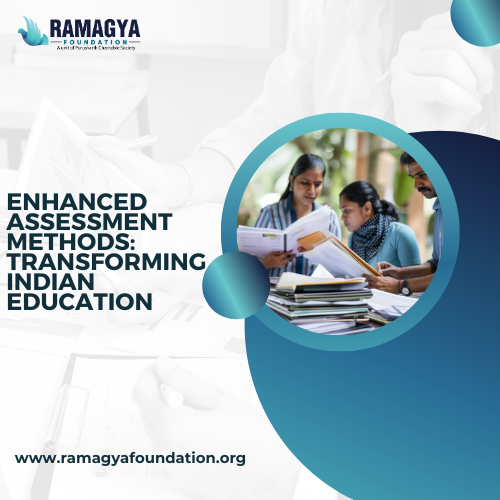Assessment techniques play an important influence on the educational system of any nation and India is not an exception. In the past, tests within Indian education have typically been based on grades and exams. They can hinder the ability of students to show their complete range of skills and understanding.
However, in recent times, there has been an increasing recognition of the need for more effective assessment techniques that go beyond the conventional testing types. These techniques aim to give an overall view of the abilities of students and help them develop their skills and help students prepare to succeed in a competitive world.
Understanding Assessment Methods
Assessment methods are ways that educators assess students’ learning performance, accomplishments and capabilities. Although traditional methods such as examinations written by hand and tests that are standardized remain common at Indian schools.
There’s an increasing trend to adopt different assessment methods that cater to various learning styles and encourage creative thinking, critical thinking, and practical abilities.
Importance of Enhanced Assessment Methods in Indian Education:
- The Holistic Approach to Learning:
Assessment methods that are enhanced, like project-based assessments, portfolios, and performance tasks, enable students to show their understanding and use of knowledge in real-world situations. This approach goes beyond memorization and fosters deeper understanding and problem-solving capabilities.
- Individualized Learning:
By providing various assessment options teachers are able to better understand the strengths and weaknesses of each student and needs for learning. This method of personalization helps create a customized curriculum for each student by providing individualized support and helping to encourage academic growth.
- Reduction in Exam Stress:
Different assessment techniques reduce dependence on high-stakes tests that can cause anxiety and stress for students. Continuous assessment gives feedback that allows students to monitor their progress and identify areas of improvement.
- Training for the Future:
In the current world of rapid change, employers are looking for candidates who have a variety of abilities, such as critical thinking and communication, as well as collaboration and creative thinking. Assessment methods that are more rigorous help students improve these skills and prepare students for higher education and workplace.
Types of Enhanced Assessment Methods
- Project-Based Learning:
Students participate in projects that involve hands-on research and planning, as well as collaboration and presentation of results. This approach tests not just the content of the lesson but also teamwork, problem-solving, and the ability to communicate.
- Portfolios:
An accumulation of work by students throughout time, which showcases progress as well as achievements and reflections. Portfolios enable students to show their progress throughout disciplines and show evidence of their journey to learning.
- Performance Assessments:
Assessing students’ performance through demonstrations that are practical, like presentations, experiments or simulations. This assessment method assesses the use of skills and knowledge in real-world situations.
- Self and Peer Assessment:
Engaging students in assessing their own work or their peers’ performance against established standards. This encourages self-reflection, peer learning, as well as the growth in assessment skills.
- Formative Assessment:
Continuous assessments that are conducted during learning in order to assess the progress of students and provide prompt feedback. Formative assessments guide instructional choices and aid in constant improvement.
Challenges and Considerations
Implementing more effective assessment techniques in Indian education can be challenging like:
- Teacher Training: Teachers require professional development in order to successfully implement and incorporate new assessment techniques in their classrooms.
- Infrastructure and Resources: Access to materials, technology, and facilities could be different, which can affect the effectiveness of various assessment techniques.
- Cultural and Perceptual Changes: The traditional views of education and assessment could affect the acceptance and use of new methods.
- Standardization and evaluation: Ensuring the fairness and consistency of evaluation practices, while embracing various learning requirements and different contexts.
Ramagya School: Empowering Learning Through Enhanced Assessment Methods
Ramagya School integrates enhanced assessment methods into its curriculum in order to encourage comprehensive learning and growth.
Through projects like assessment based on projects as well as portfolios for students, they are urged to apply their knowledge in situations in the real world, encouraging the development of critical thinking and imagination.
The school places a strong emphasis on individualized advancement by tailoring evaluations to each understudy’s needs and providing constructive feedback to help them advance. This method not only makes exams less stressful for students, but it also prepares them for the future by giving them practical experience and a deeper understanding of the material.
Through embracing a variety of assessment methods, Ramagya School ensures that each student gets a comprehensive education that fosters the development of their academic skills and personal growth in line with international education standards and addresses the distinctive learning styles and talents of each student.
Conclusion
Improved assessment techniques can change the way we think about Indian education by encouraging an integrated learning environment, individualized instruction and preparation for future problems.
Through embracing a variety of assessment methods schools can help develop students in their critical thinking, creative and practical abilities that are essential for success in school and personal development.
In the years to come, as India continues to develop its education practices, incorporating advanced assessment methods is essential to create an inclusive, efficient and student-centered education system.
By collaborating with teachers along with policymakers, stakeholders, and educators, Indian education can harness the potential of improved assessment techniques to help students and help them succeed into the twenty-first century.

